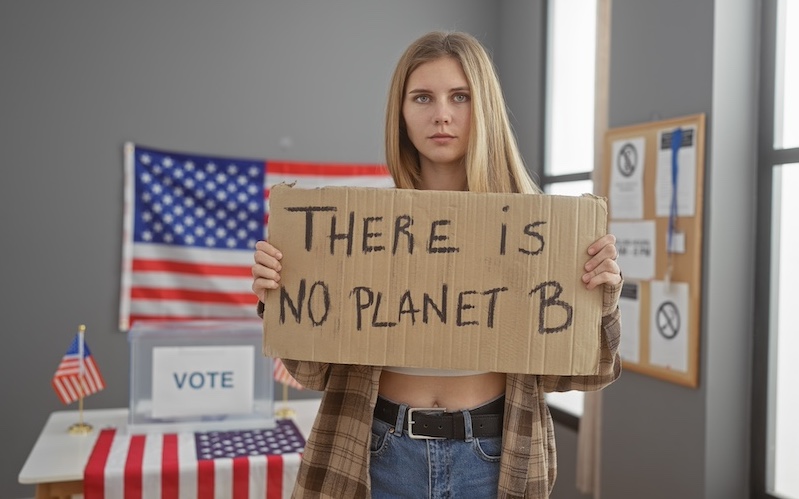
People who care about the environment know that voting can make a difference in getting action on environmental issues. Photo: Shutterstock.
If you care about the environment, voting can be tricky. That’s because candidates of all stripes are more inclined to give a nod to the beast knocking at the door – climate change. With extreme weather breaking out all over, fewer candidates are actively denying that climate change is happening, and more are devoting time to talking about it.
But will a candidate’s lip service to climate issues be converted into real action? There’s no way to know for sure. Professed “concern” for the environment doesn’t always translate into effective policy. On the other hand, whatever candidates have to say about the environment can provide important clues about what they’re likely to do in office.
So, how should you evaluate candidates when it comes to the environment in this election cycle? Here are a few pointers to help you assess state, local, and national candidates.
Pay Attention to What the Candidate Says
While words alone aren’t everything, what candidates have to say can clue you into how they prioritize climate and the environment. Listen to what they’re saying and what they aren’t saying. Read what they write.
Policy agendas (like the Heritage Foundation’s Project 2025) speak volumes, as do candidates’ social media posts. Check out what candidates say on TikTok, Instagram, X, and Threads. As you sift through policy platforms, remember what experts say are the hallmarks of a candidate who will be good on climate issues: they speak with urgency, talk in specifics, and are honest about the challenges we face.
Look at the Candidate’s Record
When candidates have already held office, things get easier. We can scrutinize their actions. A good resource is the League of Conservation Voters’ Scorecard, a handy tabulation of each Congress member’s vote on bills and climate-relevant amendments. Their website tracks recent votes but also has archives that date back to the 1970s. It reports on current and lifetime scores for even the longest-serving members of Congress. You can also check out 411.org to read about candidates’ positions. And for local candidates in towns and cities, stay connected to the local news and talk to your neighbors and friends.
Just because a race is local doesn’t mean it’s not important for the environment. Fossil fuel companies commonly invest heavily in local races (mayor or the public utility commission) because even lower-profile positions can have a major impact on oil and gas interests and the environment.
Check Out Recommendations from Environmental Groups
Environmental groups often have the resources to do the research that you may not have time to do. So take advantage of that. Vote Climate, the League of Conservation Voters Action Fund, the NRDC Action Fund, the Sierra Club, and NextGen PAC have all endorsed candidates.
Track the Money
Which candidate accepted $951,000 from the oil and gas industry in 2024? If you want to find out, visit Open Secrets. This nonpartisan, independent nonprofit tracks money in U.S. politics and its effect on elections and public policy. Click here to see how much both 2024 presidential candidates, among others, have accepted from the fossil fuel industry.
Ask the Right Questions
Reading about candidates and listening to what they say is essential in deciding how you will vote. So is asking the right questions. Here are 10 basic questions you should ask of a candidate before heading to the polls this election cycle.
- Do you agree that climate change is the most urgent issue of our lifetime?
- What will be the first steps you take to protect the environment?
- How will you support the growth of a clean energy industry?
- How will you work to improve the water, air, and health in communities located near polluting sites?
- What will you do to support and expand public transportation?
- How will you hold corporations that pollute our air and water accountable?
- What steps will you take to reduce the use of single-use plastics?
- What steps will you take to ensure we reduce our carbon emissions?
- Do you support eliminating subsidies for fossil fuels?
- Does your campaign accept contributions from fossil fuel corporations or executives?
Voting is a weighty responsibility. And when the environment is a top priority, it can feel even more so. Fortunately, there are plenty of resources that can help you to get familiar with candidates and their records before you close the voting booth curtain on Election Day.



